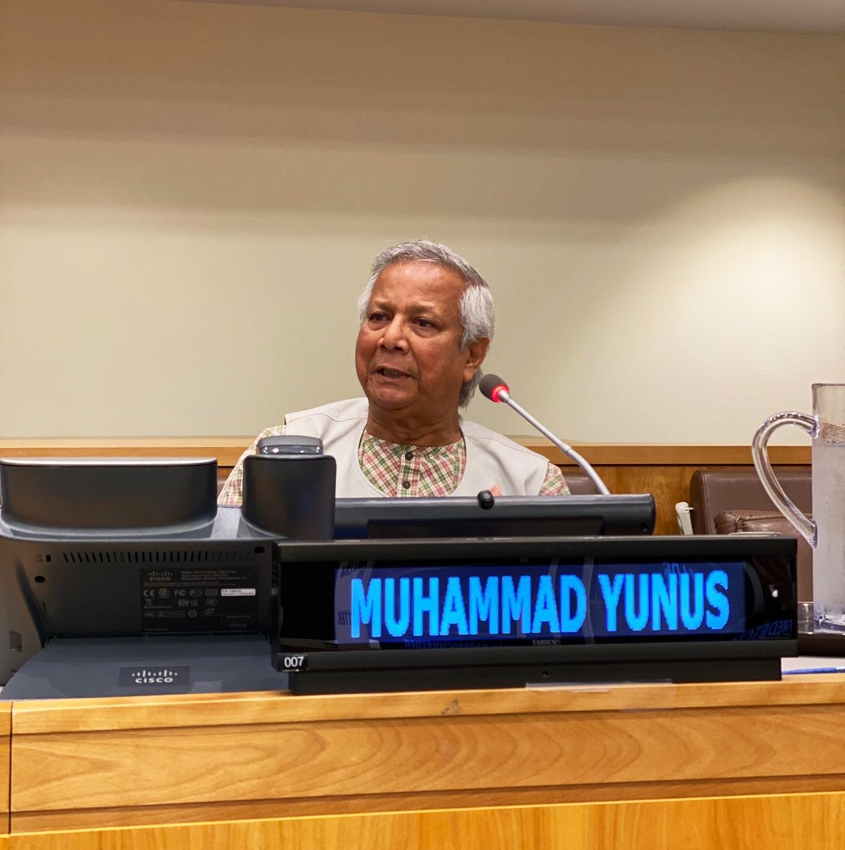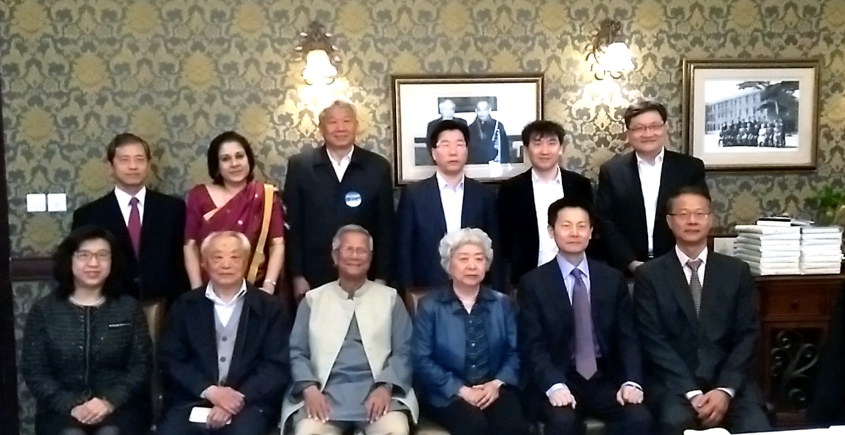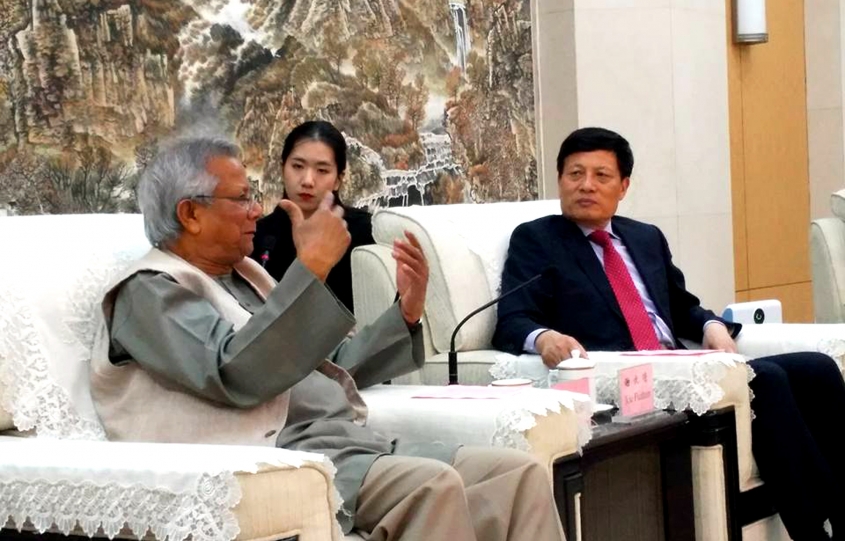Yunus Centre Press Release (30 September, 2019)
Co-Convenor Yunus calls for Ensuring Zero Financial Exclusion by Creating Social Business Banks for the Poor
On September 27th, Final Report of the Financial Sector Commission on Modern Slavery and Human Trafficking was formally released in the UN as an important UN event in New York. This Commission was set up during the UN General Assembly meeting of the previous year at the initiative of Government of Liechtenstein and joined by the Governments of Australia, the Netherlands, and the United Nations University Centre for Policy Research.
The Commission was formed to put the financial sector at the heart of global efforts to end modern slavery and human trafficking. Target 8.7 of the UN Sustainable Development Goals requires working to end modern slavery and human trafficking by 2030. Today 10,000 people become victims of modern slavery and human trafficking everyday.
The Chair of the Commission was Fiona Reynolds, CEO of the UN-backed Principles for Responsible Investment which represents over $80 trillion of assets under its management.
The Prime Minister of Liechtenstein, H.E. Mr. Adrian Hasler, was the Convenor of the Commission. Co-convenors were the Foreign Ministerof Australia, Senator The Hon. Marise Payne, and Foreign Minister of the Netherlands, H.E. Mr. Stef Blok, and Father of micro-credit, Nobel Prize laureate, Professor Muhammad Yunus.
The Commission was formed with 25 commissioners from leading financial sector leaders. The Commission held its meetings in Liechtenstein , Sydney, New York and Amsterdam during the past one year to finalize its report.
The Final Report of the Commission has a Blueprint for Mobilizing Finance Against Slavery and Trafficking. It provides a collective action framework where different financial sector actors can implement it in their own ways and at their own speeds. Over time, their collective action will lead to a stronger connection between an enterprise’s behaviour and its costs of capital. The Blueprint sets 5 goals, accompanied by 30 actions – 15 to start with now.
There is growing evidence that lack of access to safe and affordable financial products and services heightens the risk of modern slavery and human trafficking. Financial innovation and investment that increase that access are key to prevent modern slavery and human trafficking.
During the release of the Final Report at the UN chaired by Fiona Reynolds, the Chair of the Commssion, and addressed by the convenor, co-convenors, and commissioners addressed the meeting.
Professor Muhammad Yunus,the Co-Convenor of the Commission, in his remarks pointed out that it is not a market failure which deprived almost half the population of the world unreached by financial services, it is clearly a system failure. Existing financial institutions are not built to reach the low income men and women. World needs to create Banks for the Poor, particularly with social business principles , to fill that gap.
Microfinance has developed the methodology to reach the unreached, but microfinance has remained a footnote in the financial sector. It needs to be mainstreamed. He emphasized that aiming at financial inclusion is not enough, our aim should be to achieve “zero financial exclusion”.
In the absence of access to capital natural entrepreneurship among the rural people remain unexpressed. This renders them vulnerable to trafficking and exploitation.The report suggests thataccess to appropriate and safe finance, free from coercion, has the potential to help prevent modern slavery and human trafficking.
Yunus concluded saying “We must mobilize and act now. On the financial front, we must act on a crisis footing. We must use all our institutional power and leverage. Regulators and law-makers must do all they can to open up new opportunities offered by social business. Financial sector leaders must work not just to address modern slavery and human trafficking at the margins, but also by rethinking their business models to address the root causes and drivers – including financial exclusion.
Caption for Photo 1: "Financial sector leaders must work not just to address modern slavery and human trafficking at the margins, but also by rethinking their business models to address the root causes and drivers – including financial exclusion", Co convener of the event, Professor Yunus.

The Liechtenstein Commission launching its report on Modern Slavery and Human Trafficking with a Blueprint for Mobilizing Finance Against Slavery and Trafficking at the UN.
End
Appendix
Convenor
H.E. Mr. Adrian Hasler, Prime Minister, Principality of Liechtenstein
Co-Convenors
H.E. Mr. Stef Blok, Minister of Foreign Affairs, Government of the Kingdom of the Netherlands
Senator the Hon. Marise Payne, Minister for Foreign Affairs and Minister for Women, Government of Australia
Professor Muhammad Yunus, Nobel Laureate and Founder, Grameen Foundation
Chair
Fiona Reynolds, CEO, UN-backed Principles for Responsible Investment
Commissioners
James Kofi Annan, President and Founder, Challenging Heights
Jean Baderschneider, CEO, Global Fund to End Modern Slavery
Tanja Cuppen, Chief Risk Officer, ABN Amro Group N.V.
Olivier de Perregaux, Chief Financial Officer, LGT Group
Mark Eckstein, Director of Environmental and Social Responsibility, CDC Group
Jennifer Fowler, Director, Brunswick Group
The Hon. Rob Jolly, Chair, Utilities Trust of Australia
Barry M. Koch, Esq, Barry M. Koch PLLC
Shawn MacDonald, CEO, Verité
Ed Marcum, Managing Director, Working Capital
Amol Mehra, Managing Director — North America, Freedom Fund
Timea Nagy Payne, CEO and Founder, Timea’s Cause
Anne-Maree O’Connor, Head of Responsible Investment, New Zealand Superannuation Fund (Te Kaitiaki Tahua Penihana Kaumātua o Aotearoa)
Bob Prince, Co-CIO, Bridgewater Associates
Anita Ramasastry, Roland L. Hjorth Professor of Law and the Director of the Graduate Program in Sustainable International Development, University of Washington School of Law
Frederick Reynolds, Global Head of Financial Crime Legal, Barclays
Leonardo Sakamoto, President, Repórter Brasil and Member of the Board, UN Voluntary Trust Fund on Contemporary Forms of Slavery
Dawne Spicer, Executive Director, Caribbean Financial Action Task Force
Anders Strömblad, Head of Alternative Investments and External Management, AP2
Alison Tate, Director of Economic and Social Policy, International Trade Union Confederation
Simon SC Tay, Chairman, Singapore Institute of International Affairs
Daniel Thelesklaf, Director, Money Laundering Reporting Office Switzerland
Hennie Verbeek-Kusters, Head, FIU — the Netherlands
AmbassadorChristianWenaweser(Commissionere.o.),PermanentRepresentativeofthePrincipalityofLiechtensteintotheUnitedNations in New York
James Cockayne (Commissioner e.o.), Director, United Nations University Centre for Policy Research, Head of Secretariat
----




 SOCIAL BUSINESS
SOCIAL BUSINESS 

 Events
Events News
News








